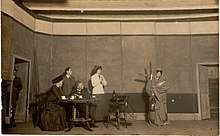Actresses' Franchise League

The Actresses' Franchise League was a women's suffrage organization, mainly active in England.
Founding
In 1908 the Actresses' Franchise League was founded by Winifred Mayo and Sime Seruya at a meeting in the Criterion Hotel in London, as a sister organization to the Women Writers' Suffrage League. While "actresses" are specified in the organization's name, anyone working in the theatre was welcomed to join. British actresses who joined included Sybil Thorndike, Italia Conti, Inez Bensusan, Madge Kendal, Gertrude Elliott, Ellen Terry, Lillah McCarthy, Decima Moore, Cicely Hamilton, Beatrice Forbes-Robertson Hale, Christabel Marshall, Lena Ashwell, Edith Craig, Janette Steer, and Lily Langtry. The group had three main objectives: 1. To convince members of the Theatrical profession of the necessity of extending the franchise to women. 2. To work for Votes for Women on the same terms as they are, or may be, granted to men by educational methods. 3. To assist all other leagues whenever possible. The League itself was strictly neutral in regard to Suffrage Tactics meaning the organization did not endorse militant protest campaigns. However, there were some members who were also a part of the Women’s Social and Political Union which was known for their militant demonstrations. By 1911, the AFL membership reached 750 members. [1][2]
Activities
The AFL had very specific means of accomplishing their goals. These educational methods were delineated as i) Propaganda Meetings, ii) Sale of Literature, iii) Propaganda Plays, iv) Lectures. The propaganda meetings were often held in restaurants and were successful in gathering people already in support of the woman’s vote as well as many who entered with little to no interest and left as supporters. Literature, including plays and sketches by pro-suffrage writers, was sold at all AFL events. Propaganda plays were performed either as fillers between speeches and debates or as the main attraction. AFL’s first big event that featured such plays was at the Scala Theatre in 1909. The lectures had lower attendance rates, since they were not as entertaining as the plays. The AFL often collaborated with other suffrage groups, particularly the Women Writer’s Suffrage League. Writers and dramatists in this group, like Cicely Hamilton, provided many of the plays and skits performed by the AFL. The two groups shared many of the same members. The Women’s Social and Political Union was another prominent group with whom the AFL associated. The AFL performed at WSPU’s Women’s Suffrage Exhibition in 1909 and then at WSPU’s Christmas Fair and Festival in 1911. The "Mud March" of 1907, organized by Edith Craig, involved 3000 women marching on Parliament to demand the woman's vote. It got its name because the weather on the day of the march was terrible, but the protesters continued nonetheless.
Legacy
The AFL was officially disbanded in 1934. Papers of the Actresses' Franchise League are held in the Women's Library in London.[3] The Museum of London has a large banner of the AFL in its collection.[4] Some of the plays created for the AFL to perform have been reprinted in recent years, and are produced on occasion, often to mark an anniversary of the suffrage movement.[5]
The fight for equality between men and women gained lots of ground in the twentieth century. In England, The Representation of the People Act 1918 granted women the right to vote at age thirty. Then, in 1928, The Representation of the People (Equal Franchise) Act allowed women to vote at the age of twenty-one, the same age as men. Women’s suffrage in the United States was enacted by the nineteenth amendment in 1920. Since then, women have secured more reproductive rights and workplace rights among others.
References
- ↑ Claire Hirschfield, "The Actresses' Franchise League and the Campaign for Women's Suffrage 1908-1914," Theatre Research International 10(2)(Summer 1985): 129-153.
- ↑ Michael Holroyd, A Strange Eventful History: The Dramatic Lives of Ellen Terry, Henry Irving, and their Remarkable Families (Macmillan 2010).
- ↑ Actresses' Franchise League collection, finding aid, Women's Library.
- ↑ Museum of London, Suffrage banner of the Actresses' Franchise League: c. 1911.
- ↑ Viv Gardner, ed., Sketches from the Actresses' Franchise League (University of Nottingham 1985). ISBN 0906129095
- ↑ Baker, Jean H.. Votes for Women : The Struggle for Suffrage Revisited, Oxford University Press, 2002. ProQuest Ebook Central, https://ebookcentral.proquest.com/lib/bayloru/detail.action?docID=241521.
- ↑ Gardner, Viv. Sketches from the Actresses' Franchise League. Nottingham: Nottingham Drama Texts 20th Century, 1985.
- ↑ Hannam, June. Feminism, Taylor and Francis, 2013. ProQuest Ebook Central, https://ebookcentral.proquest.com/lib/bayloru/detail.action?docID=1356320.
- ↑ Hirshfield, C. (1994). “The Actresses' Franchise League in Peace and War”: 1913-1918. New England Theatre Journal, 5, 35-49. Retrieved from http://ezproxy.baylor.edu/login?url=https://search.proquest.com/docview/230005396?accountid=7014.
- ↑ “Women in the U.S. Congress 2018.” Women in the U.S. Congress 2018. CAWP, www.cawp.rutgers.edu/women-us-congress-2018.